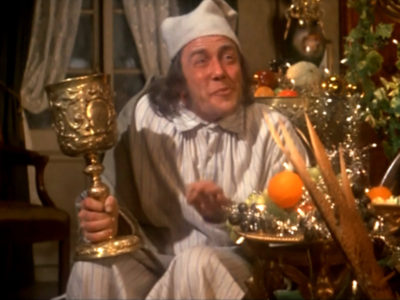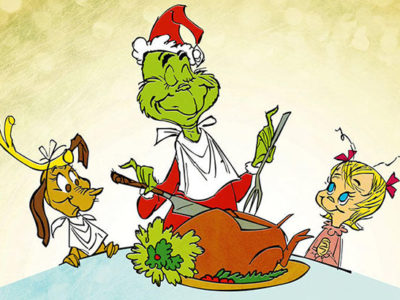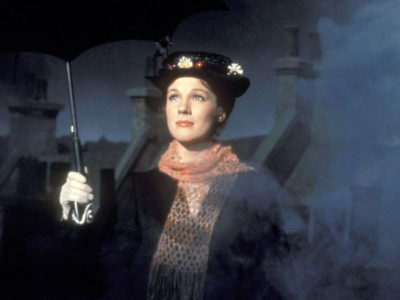Reviewing the Classics| Scrooge
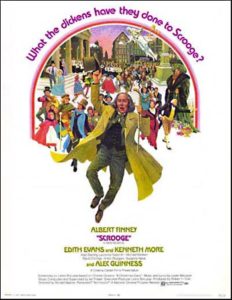 Charles Dickens’ story A Christmas Carol is well nigh inescapable during this time of year. Even without reading the book or watching any of the dozens of film and stage adaptations, we still encounter it. The word “scrooge” is part of our (seasonal) everyday vernacular. Countless movies and television episodes refer to the Ghost of Christmases Past, Present, and Future. Dickens’ heartwarming and hopeful tale of redemption is ingrained in our cultural consciousness. And yes, while there really are dozens of screen adaptations out there–some better than others–I personally have a soft spot for the classic musical Scrooge.
Charles Dickens’ story A Christmas Carol is well nigh inescapable during this time of year. Even without reading the book or watching any of the dozens of film and stage adaptations, we still encounter it. The word “scrooge” is part of our (seasonal) everyday vernacular. Countless movies and television episodes refer to the Ghost of Christmases Past, Present, and Future. Dickens’ heartwarming and hopeful tale of redemption is ingrained in our cultural consciousness. And yes, while there really are dozens of screen adaptations out there–some better than others–I personally have a soft spot for the classic musical Scrooge.
Nominated for 4 Oscars and 5 Golden Globes, beautifully shot in anamorphic widescreen, and doing proper justice to Dickens’ biting sense of humor, Scrooge is a holiday cinematic gem that the whole family can enjoy year after year. And while it takes some liberties with the text–which, as a fairly hard-core Dickensian, I could take issue with–the musical Scrooge still effectively and thoroughly tells Dickens’ classic and beloved story.
Albert Finney, exercising his prodigious strength as an actor, superbly plays the role of Ebenezer Scrooge. Most adaptations of A Christmas Carol cast different actors to portray the present-day Scrooge and his younger self. Not so in Scrooge. Finney, who was 34 years old at the time the film was made, utterly transformed himself into an old, decrepit miser. He was awarded a Golden Globe for his performance. David Collings’ portrayal of Bob Cratchit is an absolute delight; he injects indefatigable optimism into the character of the poor clerk who is trying his very best to provide a happy home for his family with very little to live on. We get the impression that the Cratchit children have little idea of just how poor they are–because their father emphasizes only the good, and how blessed they are to have what they do have. And of course Alec Guinness makes an excellent ghost of Jacob Marley.
One of the keys for any musical is for the songs to actually do some of the work of storytelling (rather than everyone just dropping what they are doing to sing and dance about). In Scrooge the songs are beautifully woven into the narrative in a way that enhances and enriches the story. The musical numbers near the beginning of the movie are used to richly illustrate the conditions in Victorian-era London and show the disparity between the classes. We watch as Bob Cratchit walks through the freezing streets with his children, stopping at different outdoor vendors, purchasing the last of the food and gifts the family needs for Christmas Day. All the while, we see the wealthier classes, richly and warmly dressed, strolling in and out of beautiful shops that are positively glowing with warmth; the shops are stocked with fine wines, fresh meats, and gourmet delicacies that the poor Cratchits would never dream of making a part of their Christmas festivities. Later, when Scrooge finally leaves the office, he drops in on several of his debtors in between verses of “I Hate People.” The city is rife with opportunities to help one’s fellow man, and Scrooge at best turns a blind eye to the suffering around him–at worst he actually, well, makes it worse.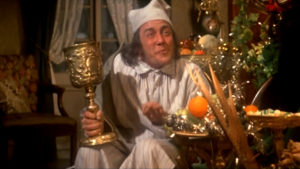
Many of the musical numbers are pure joy: December the 25th (the song at Fezziwig’s party in Scrooge’s past) will make you want to jump out of your seat and dance; the theme song of the Ghost of Christmas Present (played by Kenneth More), “I Like Life,” will add a skip in your step for as long as it stays in your head (probably a few days); and the finale will leave you misty-eyed and full of warm fuzzy Christmas feelings.
It’s Scrooge’s redemption, his transformation from a self-centered misery-maker into a warm and caring actual human being, that gives the story its resonance. When the Ghosts open Scrooge’s eyes to the difference that one moment, one decision, one life can make, he determines to start reaching out and helping people rather than hiding away and even hurting them. Ebenezer Scrooge declares: “I will honour Christmas in my heart, and try to keep it all the year.” And he keeps his promise: “…and it was always said of him, that he knew how to keep Christmas well, if any man alive possessed the knowledge. May that be truly said of us, and all of us! And so, as Tiny Tim observed, God bless Us, Every One!”
Merry Christmas to you and yours.


